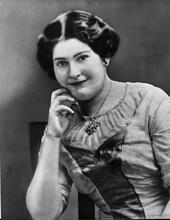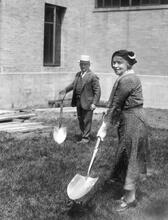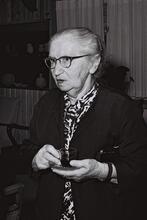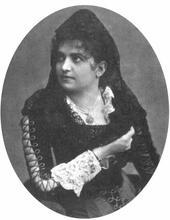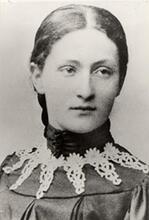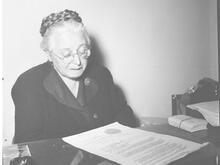Judith G. Epstein
Judith Epstein led Hadassah through the tumultuous years of World War II, shifting its mission from building infrastructure in Palestine to establishing an internationally recognized Jewish state. Epstein graduated Hunter College in 1916 and joined Hadassah a year later, while working as a high school teacher. In 1928 she was elected national secretary and six years later chaired the building fund for the Rothschild-Hadassah-University Hospital in Jerusalem. She became president of the organization in 1937, representing Hadassah at the World Zionist Congresses of 1937 and 1939. During her tenure, Hadassah became the largest Zionist organization in the world. Epstein continued to work on behalf of the organization long after her presidency ended, chairing committees and representing Hadassah before the United Nations.
Article
Deeply committed to the establishment and development of the State of Israel, Judith G. Epstein dedicated her career as a social and political activist to Hadassah, the Women’s Zionist Organization of America. She served Hadassah in many leadership roles, including two terms as president. She also attended several meetings of the Zionist World Congress as a delegate, served as a representative to the United Nations, and was largely responsible for funding the Rothschild–Hadassah–University Hospital in Jerusalem.
Judith Epstein was born in Worcester, Massachusetts, on November 2, 1895, to Sarah (Baum) and Edward Epstein, both of Eastern European descent. Her father was a wholesaler of upscale men’s sportswear, and her mother, like herself, was active in Hadassah and other charitable organizations. The Epsteins had three children, Judith, the eldest, and two sons, Joshua and Abbe. She graduated from Hunter College in 1916 and went on to teach English at the Julia Richman High School in New York City. She married Moses P. Epstein, a textile manufacturer, in 1917. Epstein’s mother was one of the earliest members of Hadassah, and Epstein herself was a member by 1917. By age twenty-four, she had been named president of the West End chapter of Hadassah, and in 1928 she was elected national secretary. In 1934 she was chair of the building fund for the Rothschild–Hadassah–University Hospital, and then served two terms as president (1937–1939, 1943–1947).
Epstein’s early years in Hadassah were marked by great changes for international Jewry. Hadassah’s initial mission was to bring much-needed health care, research, and teaching to Palestine. Yet under Epstein’s leadership during World War II, the desire for a Jewish homeland became more relevant. As Hadassah’s representative, she was involved firsthand in the political battles to establish the State of Israel, attending Zionist World Congress meetings, visiting the displaced persons camps in Europe, and traveling to Israel often.
As Hadassah’s representative, Epstein headed delegations to the 1937 and 1939 World Zionist Congresses. The 1939 Congress in Geneva was particularly difficult, as war was declared only twenty-four hours after Epstein boarded a ship home. At the request of her husband, she left the presidency after the Geneva Congress, but returned to the organization four years later. At the time of her leadership, Hadassah’s membership grew so rapidly that it became the largest Zionist organization in the world.
Judith Epstein’s dedication to Hadassah, however, did not wane after her presidency. She continued to serve the organization by chairing numerous committees and assisting in daily operations. In addition to her Hadassah activities, Epstein served as chair of the Public Relations Committee of the American Zionist Council and spent several years as Hadassah’s representative to the United Nations.
Epstein was recognized for her commitment to Israel and Hadassah when the organization established an endowment and memorial award in her name. She was also named a Distinguished Alumna of Hunter College.
Judith Epstein was the mother of two children, Naomi Cohen and David Epstein, grandmother of five, and great-grandmother of nine. She died of a heart attack on October 27, 1988, in New York City.
EJ; Epstein, Judith G. Papers. Hadassah Archives, New York.
Obituary. NYTimes, October 28, 1988.
“Old Age: A Case of Spirit Not Chronology.” NYTimes, January 23, 1974.
UJE.
WWIAJ (1938, addenda).



